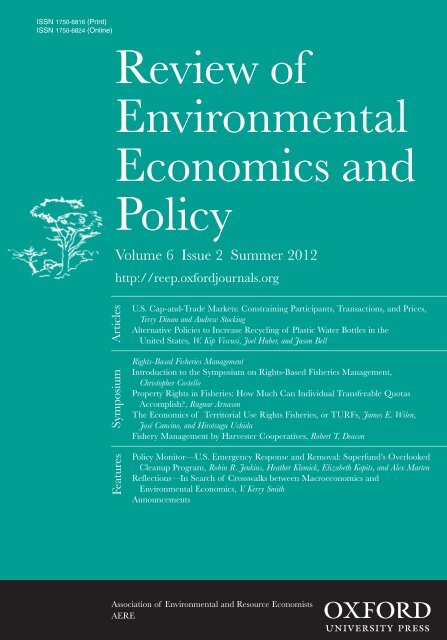How Should We Think about Environmental Policy and Jobs? An Analogy with Trade Policy and an Illustration from U.S. Coal Mining
IF 6.6
3区 经济学
Q1 ECONOMICS
引用次数: 11
Abstract
Public discussions of environmentally motivated policies include much confusing talk about job loss. Does job loss in a polluting industry mean that others should endure dirty air or that complementary policies are needed? To clarify the jobs issue, I use concepts from research on international trade policy and its effects and apply them to recent job loss in the U.S. coal industry. The case of coal illustrates the economic adjustment that could arise from an environmental policy as well as the equity, efficiency, and political issues that adjustment raises. I show that for each coal job lost, earnings in the surrounding county fell by nearly $100,000, and that one-third of those who lost jobs did not move and remained unemployed. On average, the losses affected poorer counties and exacerbated income disparities between counties. Concurrently, coal county voters shifted toward pro-coal candidate Donald Trump in the 2016 U.S. presidential election, helping him win Pennsylvania. More broadly, I argue that environmental adjustment assistance of some form may improve the equity and political feasibility of environmental policies that benefit many but harm some. However, the how and when of such assistance requires further study.我们应该如何看待环境政策和就业?与贸易政策的类比及美国煤矿业的启示
公众对环境激励政策的讨论中包含了许多令人困惑的关于失业的讨论。一个污染行业的失业是否意味着其他人应该忍受肮脏的空气,或者需要补充政策?为了澄清就业问题,我使用了国际贸易政策及其影响研究中的概念,并将其应用于美国煤炭行业最近的失业问题。煤炭的例子说明了环境政策可能带来的经济调整,以及调整带来的公平、效率和政治问题。我指出,每失去一个煤炭工作岗位,周边县的收入就会减少近10万美元,而三分之一的失业者没有搬家,仍然处于失业状态。平均而言,这些损失影响到较贫穷的县,并加剧了县与县之间的收入差距。与此同时,煤炭县的选民在2016年美国总统大选中转而支持支持煤炭的候选人唐纳德·特朗普,帮助他赢得了宾夕法尼亚州。更广泛地说,我认为某种形式的环境调整援助可能会提高环境政策的公平性和政治可行性,这些政策使许多人受益,但损害了一些人。然而,这种援助的方式和时间需要进一步研究。
本文章由计算机程序翻译,如有差异,请以英文原文为准。
求助全文
约1分钟内获得全文
求助全文
来源期刊
CiteScore
10.80
自引率
0.00%
发文量
25
期刊介绍:
The Review of Environmental Economics and Policy fills the gap between traditional academic journals and the general interest press by providing a widely accessible yet scholarly source for the latest thinking on environmental economics and related policy. The Review publishes symposia, articles, and regular features that contribute to one or more of the following goals: •to identify and synthesize lessons learned from recent and ongoing environmental economics research; •to provide economic analysis of environmental policy issues; •to promote the sharing of ideas and perspectives among the various sub-fields of environmental economics;

 求助内容:
求助内容: 应助结果提醒方式:
应助结果提醒方式:


